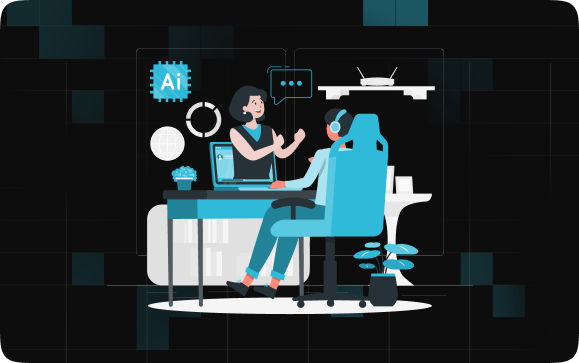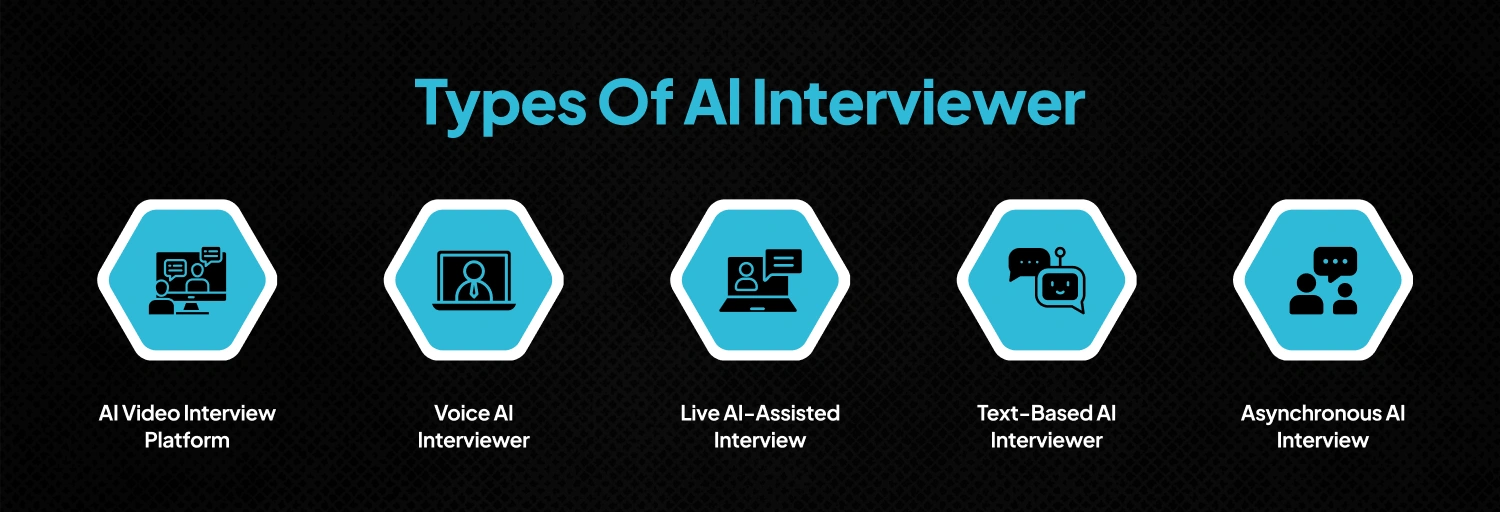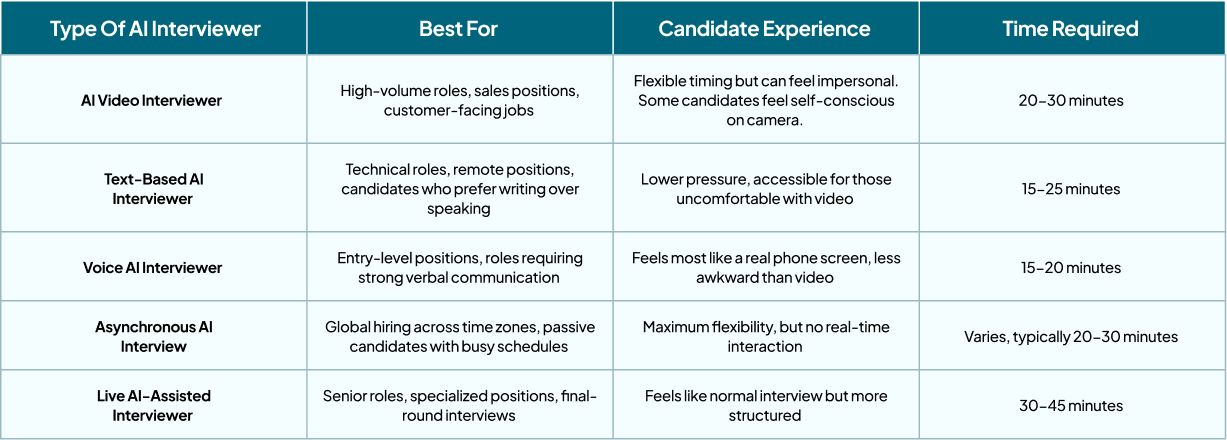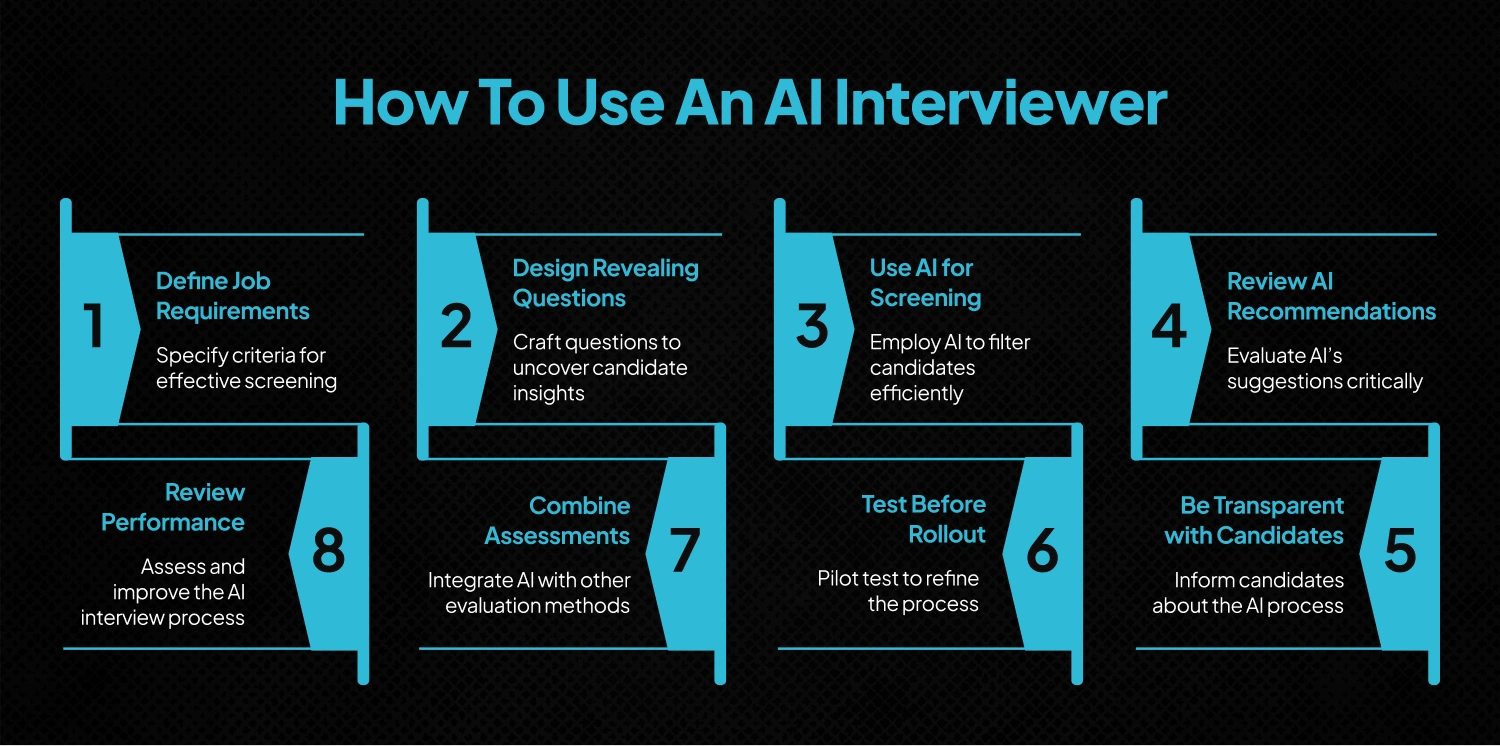A detailed guide on AI Interviewer and its impact on Hiring
Read Time
12 minutes
Updated On
December 11, 2025
.jpeg)
Ruchi Kumari
Content & Thought Leadership

I remember talking to a recruiting manager last month who looked absolutely exhausted. She'd just finished conducting 47 first-round interviews in three weeks. Forty-seven. For one position.
"I'm asking the same questions over and over," she told me. "Tell me about yourself. Why are you interested in this role. By interview 20, I'm not even listening anymore. I'm just going through the motions."
If you're a recruiter or hiring manager, you've probably been there. We've all been there.
Here's where things get interesting. Whether you are a fast-growing startup or a large enterprise handling thousands of applications, an AI Interviewer allows you to assess candidates at scale. It works 24/7, delivers structured reports, and integrates easily into your existing hiring workflow.
We're going to break down everything about AI interviewers, what works, what doesn't, and how to actually use these tools without losing the human touch that makes great hiring possible.
Let's figure this out together.

An AI interviewer is a sophisticated digital system that interacts with job candidates, conducts interviews, analyzes responses, and provides insightful candidate evaluation without depending entirely on human intervention.
Think of it like this, you know how initial phone screens are mostly the same questions repeated dozens of times? An AI interviewer handles that repetitive part. It asks questions, analyzes responses, evaluates candidates against job criteria, and identifies top matches for human recruiters to review, even providing real time insights during the evaluation.
The key thing to understand: an AI interviewer is a screening tool, not a replacement for human decision-making. It's designed to handle the time-consuming early stages so recruiters can focus on meaningful conversations with qualified candidates identify truly top talent.
Technical Components of AI Interviewer:

Not all AI interviewers work the same way. Here's a breakdown of the main types and when each works best:

Which Type Should You Use?
Many companies use a combination, AI video interviews for initial screening, then live AI-assisted for second-round conversations.
Let's get into the actual mechanics, because understanding how AI interviewer work helps you use them better (or prepare for them if you're a candidate).
The company defines job requirements, must-have skills, question sets, and evaluation criteria. This is crucial, poor setup leads to poor results. Most platforms let you customize questions or use pre-built templates for common roles.
Candidates receive a link via email to complete the AI interview. For asynchronous interviews, they typically have 3-7 days to complete it. Instructions explain what to expect and how long it takes.
The candidate interacts with the AI through their chosen medium (video/voice/text). The AI presents questions one at a time, gives candidates time to respond, and adapts follow-up questions based on those responses. Most AI interviews take 15-30 minutes.
Here's where the technology works: The AI transcribes audio/video, runs natural language processing to understand meaning and context, identifies key competencies and qualifications, compares responses to ideal answer patterns, and evaluates communication effectiveness. This happens in minutes.
Recruiters access a dashboard with candidate scores, detailed analysis, interview recordings or transcripts, highlighted strengths and concerns, and recommendations on who to advance to human interviews.
Real Example: A tech company received 150 applications for a software engineering role. They used an AI video interviewer platform for initial screening. Candidates completed 25-minute interviews answering technical and behavioral questions. The AI analyzed all 150 interviews in 6 hours, ranking candidates and flagging the top 20 for human review. The recruiting team spent 4 hours reviewing those 20 (versus the 75+ hours traditional phone screens would have required). They advanced 8 to technical interviews and made a hire within 3 weeks.
Let's talk about what AI powered interviewer tools actually deliver in practice. These aren't theoretical benefits - they're what companies consistently experience.

A recruiter conducting 30-minute phone screens for 50 candidates spends 25 hours just on interviews. With an AI interviewer, those 50 candidates complete interviews in a few days without any recruiter time. The recruiter spends maybe 3-4 hours reviewing AI analysis. That's an 80%+ time reduction.
Human interviewers have bad days. We get tired, ask different follow-ups, and unconsciously adjust our standards throughout the day. AI powered interviewer ask identical questions the same way every time. Every candidate gets an equal experience.
Candidates can complete AI interviews at 11pm in their pajamas if they want. No more scheduling coordination. This is huge for passive candidates who have jobs and can't take calls during work hours.
Surprisingly, many candidates prefer well-designed AI interviews to bad phone screens. Why? They're convenient, consistent, lower pressure for anxious candidates, and faster (no waiting weeks for feedback). Research shows that 38% of candidates have a positive view of AI in hiring when it speeds up the process.
Whether you have 20 or 200 applicants, AI handles them simultaneously. A retail company hiring 500+ seasonal workers reduced their recruiting team from 3 people to 1 by using AI for initial interviews.
AI generates useful data showing patterns across candidates, which qualifications correlate with success, and which interview questions are most predictive. This helps you continuously improve your hiring process.
When configured correctly, AI can focus purely on qualifications without being influenced by appearance, accent, age, or gender. However, AI can also perpetuate bias if trained on biased data (more on this in challenges).
Having the tool is one thing. Using it well is another. Here's what actually works:
Vague criteria produce mediocre results. Instead of "good software engineer," specify "mid-level backend engineer, 3-5 years Python experience, Django and PostgreSQL, agile environments, can explain technical concepts to non-technical stakeholders."
Bad question: "What are your strengths?" Better question: "Describe a project where you had to learn a new technology quickly. What was your approach and outcome?" Use AI-generated question suggestions to improve relevance and depth. Review and refine them as needed to ensure they align with the role and uncover meaningful insights.

AI should eliminate clearly unqualified candidates and surface potentially great ones. Humans should make final hiring decisions. Use each for what it does best.
Don't blindly trust scores. One company almost rejected a fantastic candidate who scored lower on "communication skills" because they were nervous on camera but spoke naturally in person.
Tell candidates upfront they'll do an AI interview and why. Explain the process and what to expect. The worst experiences happen when candidates are surprised by AI.
Run a pilot with current employees or a small candidate group. Adjust questions and scoring based on results. One company realized their 45-minute AI interview was too long and trimmed it to 25 minutes, improving completion rates from 60% to 92%.
Use AI interviews alongside resume screening, skills assessments, human interviews for cultural fit, and reference checks. Layer multiple evaluation methods for best results.
Schedule quarterly reviews: Are AI-surfaced candidates performing well when hired? Is there diversity in your candidate pool? What's the candidate feedback? Are completion rates good? Treat your AI interviewer as a tool needing maintenance and improvement.
Real talk. AI interviewers have legitimate challenges you need to consider.
Some jurisdictions regulate AI in hiring. Illinois requires consent for AI evaluation. New York City mandates bias audits. California has advanced new rules around automated decision-making technology (ADMT), requiring transparency, risk assessments, and consumer opt-out rights. Ensure compliance with GDPR, ADA accommodations, state AI hiring laws, and EEOC guidelines.
If training data reflects historical bias (which most hiring data does), AI can perpetuate it. If you've historically hired mostly men for engineering roles, AI might learn to favor male candidates. Solution: Regularly audit outcomes, ensure diverse training data, and have humans review for fairness.
Not everyone is comfortable with AI interviews. Some find them impersonal or frustrating. We've seen candidates drop out entirely. Solution: Offer human phone screen alternatives when requested.
AI struggles with sarcasm, cultural communication styles, non-verbal context, and nuances requiring human life experience. A perfectly good answer might score poorly due to cultural communication differences. This is why human review is critical.
Video doesn't load, audio cuts out, platform crashes. These failures create terrible candidate experiences. Make sure your platform is reliable and has good support.
AI isn't perfect. Someone scored low might be amazing for reasons AI can't capture - unconventional experience, better in person than on camera, or having a bad day during the interview. Always have humans review decisions.
AI platforms need initial setup time, ongoing optimization, regular auditing, team training, budget, and technical support. Make sure you can manage the tool well.
AI interviews are becoming standard for high-volume roles. Companies hiring for retail, customer service, and entry-level positions increasingly use AI powered interviewer by default, not as experiments.
Natural language processing is getting dramatically better. AI understands context, picks up qualifications expressed differently, and asks more relevant follow-up questions than just two years ago.
Integration with other HR tech is improving. AI interview results automatically populate in your ATS, creating smoother workflows without juggling multiple systems.
The future of interviewing isn't humans OR AI. It's humans AND AI working together, with each doing what they do best.
AI interviewers are genuinely useful tools when used right. Virtual interviews are already the norm in modern hiring. 82% of companies use them today, and 93% plan to keep using them, according to Forbes. This includes the rise of AI video interviewer tools and smarter AI powered interviewer systems that help both recruiters and job seekers.They make it easier to meet more candidates, schedule interviews faster, and connect with talent anywhere, removing geographical barriers altogether. They handle repetitive screening, basic qualification checks, and consistent evaluation across candidates. This frees recruiters to focus on relationship building, understanding nuance, and making judgment calls about fit.
The key is using AI as a complement to human decision-making, not a replacement. Let AI handle screening. Let humans handle selection. That combination delivers faster hiring, better candidate experiences, and ultimately better hires.
If you're considering AI powered interviewer, start small. Test with one role or department. See how candidates respond and if your team finds it valuable. Tools like Reccopilot offer free trials so you can experiment before committing.
.png)
Companies figuring out the right AI-human balance now will have a competitive advantage in talent acquisition for years to come.
